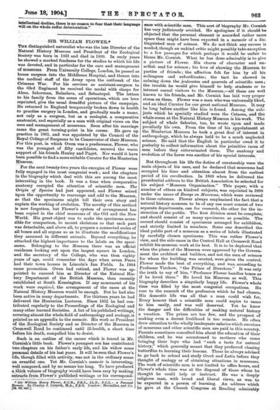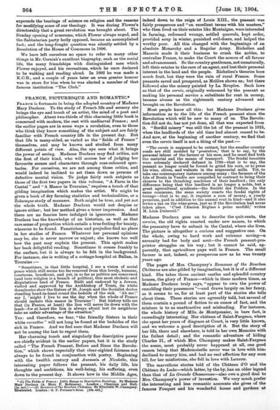THE distinguished naturalist who was the late Director of the
Natural History Museum and President of the Zoological Society was born in 1831 and died in 1899. In early years he showed a marked fondness for the studies to which his life was devoted, and in particular for the care and management of museums. From University College, London, he passed as house surgeon into the Middlesex Hospital, and thence into the medical staff of the Army upon the outbreak of the Crimean War. For his services as assistant-surgeon to the 63rd Regiment he received the medal with clasps for Alma, Inkerman, Balaclava, and Sebastopol. The letters to his family from the scene of operations, which are here reprinted, give the usual dreadful picture of the campaign. He returned to England temporarily broken down in health to practise surgery in London, and gradually made a name, not only as a surgeon, but as a zoologist, a comparative anatomist, and especially as a man with original views on the uses and management of museums. Soon after his marriage came the great turning-point in his career. He gave up practice in 1861, and was appointed by the Council of the Royal College of Surgeons to be Conservator of their Museum. For this post, in which Owen was a predecessor, Flower, who was the youngest of fifty candidates, secured the warm support of his friends Huxley and Paget. Nor would it have been possible to find a more suitable Curator for the Hunterian Museum.
For the next twenty-two years the energies of Flower were
fully engaged in the most congenial work ; and the chapters in the biography which deal with this are among the most interesting in the book. It was a time when comparative anatomy occupied the attention of scientific men. The Origin of Species had just appeared, and Flower seized upon the opportunity to rearrange and add to the Museum, so that the specimens might tell their own story and explain the working of evolution. The novelty of this method is now forgotten, but Flower's system of arrangement has been copied in the chief museums of the Old and the New World. His great object was to make the specimens acces- sible for comparison, to mount skeletons so that each part was detachable, and above all, to prepare a connected series of all bones and all organs so as to illustrate the modifications they assumed in different animals. Beyond everything, he attached the highest importance to the labels on the speci- mens. Belonging to the Museum there was BM official residence looking out upon the largest square in London, and the secretary of the College, who was then eighty years of age, could remember the days when seven Peers had their town houses in Lincoln's Inn Fields. In 1884 came promotion. Owen had retired, and Flower was ap- pointed to succeed him as Director of the Natural His- tory Department of the British Museum, then recently established at South Kensington. If any monument of his work were required, the arrangement of the cases at the Natural History Museum would be enough. But be had also been active in many departments. For thirteen years he had delivered the Hunterian Lectures. Since 1852 he had con- tributed regularly to the Proceedings of the Zoological and many other learned Societies. A list of his published writings, covering almost the whole field of anthropology and zoology, is printed as an appendix to the memoir. His work as President of the Zoological Society and as Director of the Museum in Cromwell Road he continued until ill-health, a short time before his death, compelled him to desist.
Such is an outline of the career which is traced in Mr. Cornish's little book. Flower's youngest son has contributed
two chapters on his father's early life, and his widow some personal details of his last years. It will be seen that Flower's life, though filled with activity, was not in the ordinary same an eventful one. Yet Mr. Cornish's memoir is interesting, well composed, and by no means too long. To have produced a thick volume of biography would have been easy by making extracts from Flower's published writings or his correspond- • Sir WHliam Henry Plower, .1(.0.5., KEIL, LL.D., D.O.L. : a Personal Memoir. By Charles J. Cornish, ILL, F.Z.S. London: hiaemillan Nad Co,
Cgs. ea. tea j
enoe with scientific men. This sort of biography Mr. Cornish has very judiciously avoided. He apologises if it should be objected that the personal element is accorded rather more space than might have been expected in a memoir of a dis- tinguished man of science. We do not think any excuse is needed, though an unkind critic might possibly take exception to a few passages for which perhaps it would be unfair to blame Mr. Cornish. What he has done admirably is to give a picture of Flower. His charm of character and un- selfish zeal for science ; his love of showing the Museum to parties of friends ; the affection felt for him by all his colleagues and subordinates ; the tact he showed in calming down the jealousies and quarrels of scientific men; the trouble he would give himself to help students or to interest casual visitors to the Museum,—all these are well known to his friends, and Mr. Cornish has laid very proper stress on them. Flower was a man who was universally liked, and an ideal Curator for our great national Museum. It may be long before another like him is found. Among the sub- jects which he specially studied were the Cetacea, and the whale-room at the Natural History Museum is his work. The subject of whale fisheries, too, he wrote upon and made peculiarly his own. From the time of his appointment at the Hunterian Museum he took a great deal of interest in anthropology, which lie always held to be a much neglected science. He said that the English in particular owed it to posterity to collect information about the primitive races of men before they exterminated them. The anatomy and evolution of the horse was another of his special interests.
But throughout his life the duties of curatorship were the main objects of his care, and he declared that museums had occupied his time and attention almost from the earliest period of his recollection. In 1889 when he delivered the presidential address to the British Association he selected for his subject "Museum Organisation." This paper, with a number of others on kindred subjects, was reprinted in 1898 under the name of Essays on Museums, which were reviewed in these columns. Flower always emphasised the fact that a natural history museum to be of any use must consist of two separate departments, one for research, the other for the in- struction of the public. The first division must be complete, and should consist of as many specimens as possible. The second should consist of specimens arranged for exhibition, and strictly limited in numbers. Some one described the ideal public part of a museum as a series of labels illustrated by carefully chosen specimens. This was rather Flower's view, and the side cases in the Central Hall at Cromwell Road exhibit his museum work at its best. It is to be deplored that when the plans of the Museum were approved by the Govern- ment the architect and builders, and not the men of science for whom the building was erected, were given the control. Flower made the best of everything, and was, according to Professor Virchow, "the Prince of Directors." It was only the truth to say of him, "Professor Flower handles bones as if he loved them." He loved his Museum as well. This biography describes a singularly happy life. Flower's whole time was filled by the most congenial occupations. He rose to the summit of the profession which he had chosen. His domestic life was all that a man could wish for. Every honour that a scientific man could aspire to came to him easily, and was well deserved. Yet he knew the danger and the difficulties of making natural history a vocation. The prizes are too few, and the prospect of making even a decent livelihood is too remote. He often drew attention to the wholly inadequate salaries which curators of museums and other scientific men are paid in this country. Parents sometimes consulted him about the education of their children, and he was accustomed to mothers who came bringing their boys who had "such a taste for natural history," which generally meant that they preferred chasing butterflies to learning their lessons. These he always advised to go back to school and study Greek and Latin before they thought of zoology or of obtaining situations in museums. The work of scientific men is not limited to office hours, and Flower's whole time was at the disposal of those whom he thought he could help or instruct. He was a deeply religious man, with broad and liberal views, as was to be expected in a person of learning. An address which be gave at the Church Congress at Reading admirably
expounds the bearings of science on religion and the reasons for modifying some of our theology. It was during Flower's directorship that a great revolution was brought about. The Sunday opening of museums, which Flower always urged, and the Sabbatarian party hotly opposed, became an accomplished fact; and the long-fought question was silently settled by a Resolution of the House of Commons in 1896.
We have left ourselves no space to refer to many other things in Mr. Cornish's excellent biography, such as the social life, the many friendships with distinguished men which Flower enjoyed, and his recreations, which he once declared to be walking and reading aloud. In 1892 he was made a K.C.B., and a couple of years later an even greater honour was in store for him when he was elected a member of that famous institution "The Club."
FRANCE, PICTURESQUE AND ROMANTIC.*







































 Previous page
Previous page